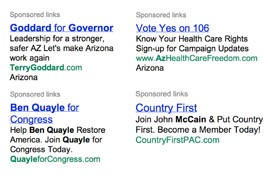- Slug: BC-CNS-AdWords-Campaigns,700
- Sidebar: Facts about Google AdWords
- Graphic available (thumbnail, caption below)
By ALYSSA NEWCOMB
Cronkite News Service
PHOENIX – Search for congressional candidate Ben Quayle on Google and you won’t just see the political progeny’s website in the top results. There’s also an eye-catching advertisement in the right column that looks strikingly similar to traditional search results.
“Someone needs to go to Washington and knock the hell out of the place,” one variation of Quayle’s ad says.
Its text is simple and conforms with the 25-character headline and 70 characters allotted to Google AdWords text. But it provides enough characters for Quayle’s team to pack a punch.
If you click the link, Quayle’s campaign pays Google a dollar or two to bring you its website.
Google’s sponsored search program, called AdWords, has become a low-cost, high-exposure way for politicians and interest groups to campaign.
Beginning with the Obama campaign in 2008, the use of paid search advertisements has skyrocketed up and down the ballot. In Arizona, others using the ads include Democratic gubernatorial candidate Terry Goddard, a group supporting a ballot proposition dealing with health care and a national group targeting Democratic congressional candidates on issues affecting the elderly.
Brant Short, a professor at Northern Arizona University’s School of Communication and a specialist in political communication, said online advertising is more interactive than traditional media.
“It adds another layer that traditional advertisements don’t necessarily give you,” he said. “It empowers the voter to find out more.”
And its ability to target a relevant audience is even greater than traditional media, said Jason Rose, a political consultant who last worked on GOP candidate Andrew Thomas’ attorney general campaign.
“With Google AdWords, you come about as close to 100 percent efficiency as possible,” he said.
Dave Cieslak, a political consultant at the Phoenix firm of Scutari & Cieslak, said a lot of “old school” politicians are now realizing the value of online outreach, including AdWords.
“It’s all part of a mix,” Cieslak said. “This is one element.”
With the support of political consultants, the use of AdWords for campaign purposes has increased 800 percent nationwide since the last election.
“The growth has been really amazing,” said Andrew Roos, a Washington, D.C.-based account executive for Google Political Ads.
He said search advertising is an easy way to begin, and candidates can get innovative with the service.
“Bidding on an opponent’s name is a best practice,” Roos said, meaning a candidate’s paid advertisement shows when a user searches for an opponent’s name.
Terry Goddard’s campaign bids on the search terms “Jan Brewer” and “Jan Brewer for governor,” for example. The competition for a keyword and the amount bid depends on how frequently Google serves up an advertisement.
Rose said it’s a tactic he’d advise clients to use.
“It’s a shrewd move and an efficient use of campaign resources,” he said.
Goddard’s campaign is also using AdWords to round up early voters.
A search for “az voting” serves up an advertisement urging people to click on the link to sign up for the permanent early voting list through Goddard’s website.
Goddard’s campaign didn’t respond to several messages left with its campaign spokeswoman.
Anthony Kirlew, a Phoenix-based Internet marketing professional and founder of a.k.a. Internet Marketing, sees the appeal of bringing campaigns into the world of AdWords.
“There are so many ways to leverage it,” he said. “And it can be up in hours.”
Roos, who previously worked on political campaigns, noted that instead of buying media time by market users can target all the way down to the ZIP code on Google’s display network.
This feature, coupled with the ability to control advertising expenditures through a set daily budget, has made AdWords appeal to more than just the major political figures who used the service in 2008.
“Up and down the ballot, candidates are starting to use it,” he said.
Arizona campaign laws require candidates to disclose when they’ve paid for a political radio or television advertisement. However, nothing in the statutes refers specifically to online advertisements, according to Matt Benson, director of communications in the Secretary of State’s Office.
Florida passed a law dubbed the Technology in Elections Act earlier this year after a complaint was filed against a mayoral candidate who utilized AdWords. The law exempts candidates from using the “paid for by” disclaimer if their advertisement is less than 200 words. The page they link to, however, must provide it.
Rose said he foresees the use of AdWords in elections to come.
“Search and Google will continue to play a role,” he said. “It’s the inevitable evolution of campaigns.”
^___=
Key facts about Google AdWords:
– AdWords is Google’s largest source of revenue, bringing in $23 billion in 2009.
– The volume of political ads served via AdWords has increased 800 percent from the 2008 election.
– Arizona candidates and campaigns using AdWords include Democratic gubernatorial candidate Terry Goddard, a group supporting a ballot proposition dealing with health care and a national group criticizing Democratic congressional candidates’ stands on issues affecting the elderly.
^___=

This graphic shows how some Arizona candidates and campaigns are using Google AdWords to target messages to Web users who demonstrate interest through search terms. They include Democratic gubernatorial candidate Terry Goddard, Republican congressional candidate Ben Quayle, a group supporting Proposition 106 and Sen. John McCain’s political action committee.
(Cronkite News Service Graphic)